The Ultimate Guide to Claude Search
Claude 3 with Web Search is Anthropic’s real-time, search-enabled AI assistant. Unlike earlier Claude models that relied solely on static training data, the latest version can now browse the live web and cite its sources—functionally blending the roles of a search engine and a conversational AI.
As these capabilities expand, more users are beginning to turn to Claude to research, compare, and explore information—often in place of traditional search engines. For SEO professionals, this creates a new opportunity—and a new challenge: understanding how Claude retrieves and ranks content is essential to ensuring your brand is visible when AI is the interface. If your content is timely, relevant, and discoverable in the right ecosystem, Claude can reference it directly and even link to it in its answers.
This guide addresses what makes Claude’s search capability unique, how it works behind the scenes, compared to similar AI search engines and why it matters as an emerging channel for marketers.
From Closed Model to Search-Enabled Intelligence
Claude was originally built as a conversational large language model trained on pre-2024 data. While its reasoning was strong, it couldn't access new information. With the addition of search, it is now capable of providing fresh results and summarizing them for the user:
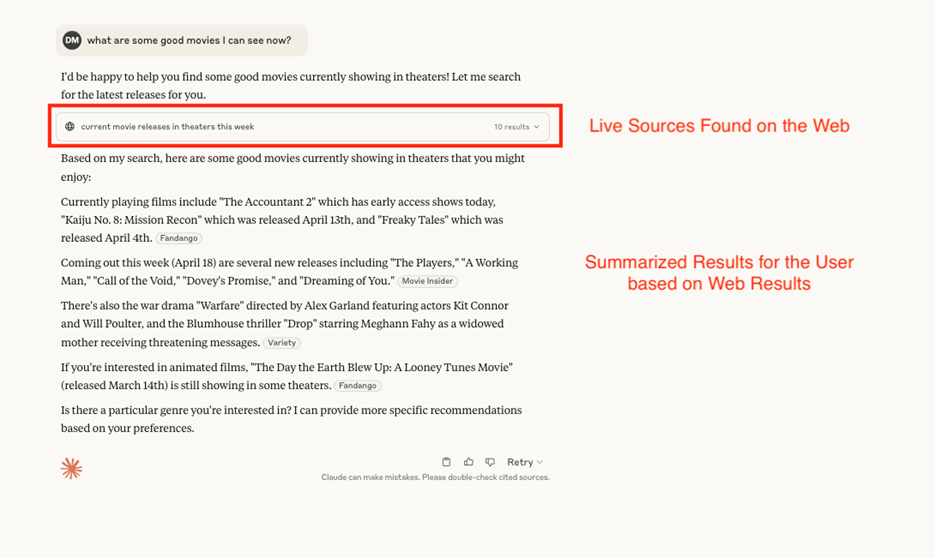
Once enabled, Claude can automatically detect when it needs fresh information and perform real-time searches to inform its responses. This search capability is optional and must be toggled on in the settings of Claude’s paid plans. Once enabled, it allows it to:
- Pull in facts from live sources
- Cite URLs inline
- Incorporate up-to-date research, stats, and commentary
- Go beyond its knowledge cutoff without user uploads
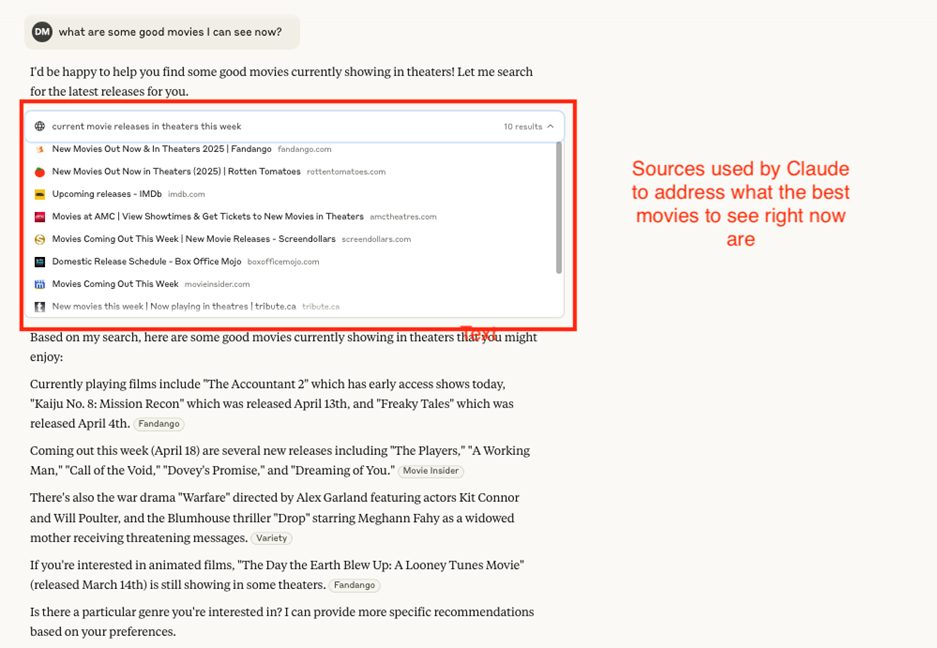
Anthropic describes this as a blend of generative reasoning with search-grounded facts—a major step toward conversational agents that behave like next-generation search engines.
Brave Search: Claude’s Index of Record
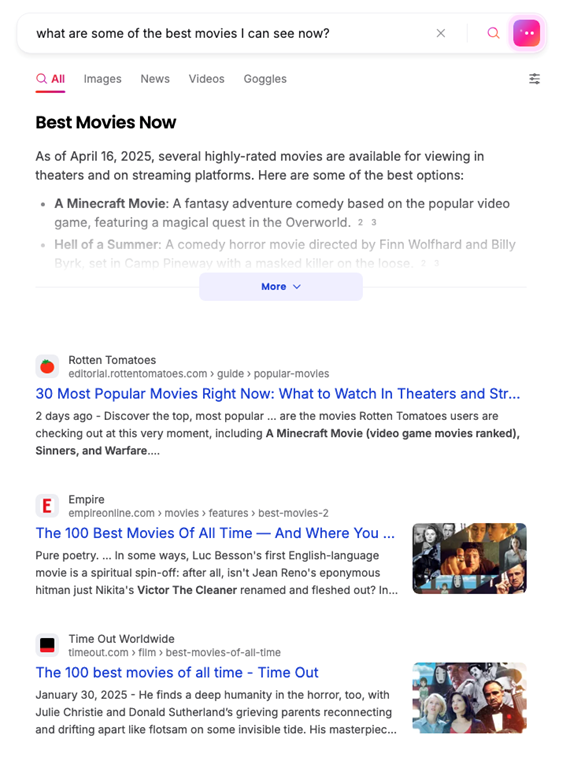
One of the most important discoveries about Claude with Search is its underlying search engine. While Anthropic didn’t initially disclose this, it has later been determined that Claude’s searches are powered by Brave Search. This means:
- Claude is not using Google or Bing results.
- Its search behavior is shaped by Brave’s process of ranking results.
- Your content must be indexed in Brave to appear in Claude’s responses. Brave does not offer a formal webmaster submission tool, but its crawler generally follows Googlebot rules. Ensure your site is crawlable and not blocking Brave via robots.txt Brave explains its crawler behavior here: Brave Search Crawler Help Page.
How Claude Search Operates
Claude doesn’t just generate answers—it decides when to search, how to search, and what to cite. Understanding this pipeline is key to earning visibility:
- Automatic Search: Claude chooses whether to invoke web search based on the query’s freshness, specificity, and intent. Not every query triggers a search.
- Query Rewriting: Claude reformulates queries into more search-friendly formats. Content that mirrors natural phrasing (e.g., the query “What are some gas powered RC cars and where can I buy one” is repurposed into “best RC cars in 2025”) is more likely to be matched.
- Brave Ranking: The top ~10 Brave results are returned and scanned. Claude filters, evaluates, and cites content from this pool.
- Citation Mechanics: Claude uses inline links or brackets to cite sources directly where information is used. There’s no footer list like Perplexity, but links are clickable in context.
Why Marketers Should Care
Claude isn’t a major traffic driver yet—but it’s a signal of where Search is going. Its integration with Brave Search marks a meaningful shift toward AI-driven, citation-based discovery, especially among users seeking alternatives to Google. For SEO professionals, Claude offers an early-stage opportunity to understand how content is selected, cited, and surfaced in AI-generated answers.
Where Claude Fits in the Search Landscape
Claude behaves more like a research assistant than a search engine. It’s especially useful for:
- Research and Discovery – helping users understand concepts, compare options, or evaluate brands
- Query types with ambiguity or nuance – such as comparisons, product research, and emerging trends
- Local and niche queries – Because Brave Search operates on its own independent index and avoids Big Tech ranking systems, it may surface alternative or lesser-known sources that aren’t as prominent on Google or Bing. According to Brave, this independence helps reduce editorial bias and supports diversity in results—especially useful for region-specific or long-tail topics.
While Claude is not yet a high-volume channel, it represents a new class of AI search surfaces that can influence the buyer journey early—even if the last click still goes to Google.
Who’s Using Claude Today?
While Claude’s audience is still emerging, we can infer early adoption patterns by looking at its integration with Brave—a browser known for attracting tech-forward, privacy-conscious users. Brave has seen rapid growth due to its ad-blocking capabilities, tracker prevention, and decentralized rewards system, drawing users who value control, transparency, and alternatives to mainstream platforms.
This profile suggests Claude is being adopted by:
- Early adopters who are more likely to experiment with new AI interfaces outside of the Google ecosystem
- Professionals and digital natives using Claude for tasks like summarization, research, and content ideation
- Users seeking sources and citation transparency, given Claude’s default behavior of citing URLs inline and surfacing attribution (in contrast to models that summarize without showing where information came from)
While not yet a mass-market assistant, Claude is gaining traction among the kinds of users who often influence digital trends early—engineers, marketers, researchers, and creators exploring more thoughtful AI interfaces.
Claude by the Numbers
While still small compared to traditional engines, Claude and Brave are growing:
- Rapid Adoption of Claude: While small, the adoption has grown to 18.9 million monthly active users worldwide.
- Brave's Expanding User Base: Brave Browser reported 82.69 million monthly active users in February 2025.
- High Engagement on Brave Search: With over 1.2 billion search queries per month, Brave Search demonstrates potential for high user engagement.
- Shift Towards AI-Augmented Search: A study by Anthropic (Claude’s parent company) revealed that 57% of users employ AI tools like Claude for augmentation rather than full automation. This trend underscores the importance of providing accurate, high-quality content that AI tools can reference and cite.
Claude Search: Key Strengths & Weaknesses (At a Glance)
Before diving into how Claude Search performs across specific industries, here’s a high-level view of its consistent strengths and limitations—based on observed behavior across e-commerce, education, and local queries.
Strengths
- Structured, Thoughtful Responses: Claude excels at organizing information into logical, user-friendly formats—sectioning answers into categories like “Where to Buy” or “Important Considerations.”
- Citation Accuracy: It only cites what it can verify. Claude avoids hallucination and flags when information is incomplete or uncertain.
- Query Interpretation: Claude is strong at understanding nuanced query intent—whether it’s informational, local, or product-focused—and tailors its response accordingly.
- Good for Research & Exploration: Most valuable in the top-of-funnel—helping users compare options, understand concepts, and evaluate possibilities.
Weaknesses
- Inconsistent Search Invocation: Not all queries trigger a web search, even when fresh or specific data is needed. Claude sometimes defaults to internal knowledge, skipping newer content.
- No Live Pricing or Inventory: Claude doesn’t show real-time pricing, availability, or reservation data—limiting its usefulness for purchase-driven queries.
- No Visual Results: It doesn’t surface product images, side-by-side comparison tables, or interactive elements, which limits UX for transactional use cases.
- Limited Personalization: Claude does not tailor answers based on user preferences, login status, or regional context unless explicitly stated in the query.
- Relies on Brave’s Index: If your content isn’t indexed in Brave—or lacks strong on-page signals for recency and structure—it won’t be visible to Claude.
In short: Claude is a conversational discovery assistant that helps users get oriented—but not necessarily to act. Brands that focus on clear, structured, and timely content can earn citations during that key research phase.
Claude vs. Other AI Search Engines
How Claude compares with DeepSeek, Perplexity, ChatGPT with Bing, and others
Claude’s ability to cite web sources in real time places it alongside other generative search systems like Perplexity and DeepSeek. But each engine has its own query behavior, source preferences, and citation logic. Here's how Claude stacks up.
E-Commerce – Direct Purchase Query Intent Analysis
Query: “What are some good gas-powered RC cars and where can I buy one?”
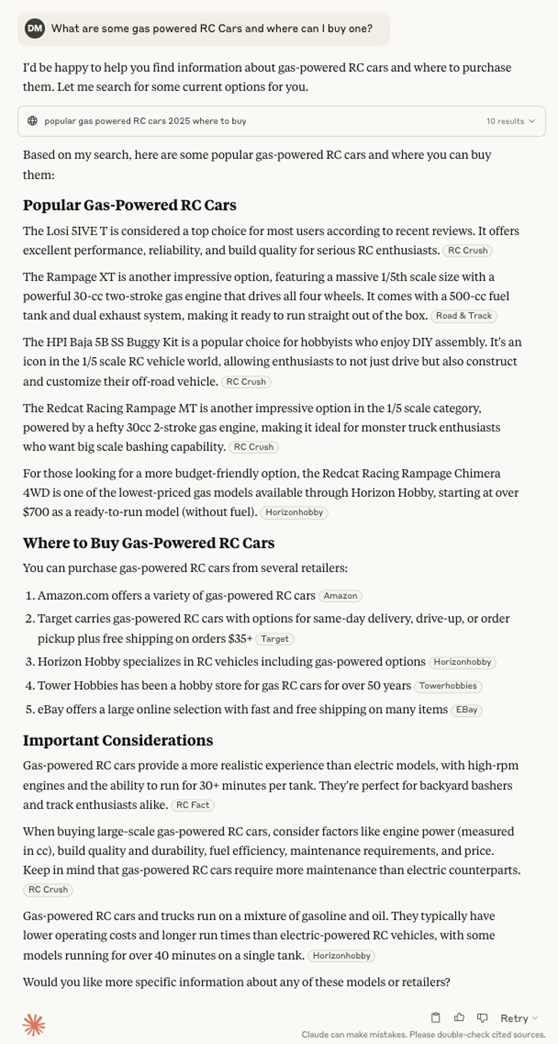
Reasoning Summary
Claude interpreted this as a two-part high-intent commercial query: (1) finding quality product options and (2) identifying purchase channels. It structured the response into clearly labeled sections: first listing popular gas-powered RC cars, then outlining where to buy them, followed by important considerations for making a purchase.
Claude used real-time search in this instance and cited multiple external sources such as RC Crush, Road & Track, Horizon Hobby, and major retailers like Amazon and Target. The product recommendations were detailed with model names, engine types, scale sizes, and suitable user types (e.g., beginner, hobbyist, monster truck enthusiasts). The buying section included key retailers and highlighted delivery perks, brand specialization, and price-conscious options.
Rather than offering prices or availability (like a shopping comparison engine), Claude focused on decision support and provided a hybrid of editorial and commercial content. Each citation appeared inline, with source attribution reflecting Brave Search’s rankings and Claude’s summarization.
Implications and Action Items for E-commerce Marketers
- Publish Product Pages with Full Technical Specs: Claude favors content with rich specifications (engine cc, fuel type, build quality, use case).
- Include Structured Product Comparisons: Group models by skill level, feature tier (e.g., beginner vs. pro), or use case (bashing, racing, etc.).
- Maintain an Active Presence in Brave Search: Claude uses Brave’s index—make sure your site is crawlable, and that product pages are not blocked by robots.txt.
- Blend Review and Commercial Info: Pages that mix specs, reviews, and purchase guidance are more likely to be cited than plain retail listings.
- Use Schema Markup Where Applicable: Add Product, Offer, and FAQ schema to increase scannability and structured access.
- Create Clear, Decision-Ready Product Content: In this example, Claude cited sources that didn’t just list products—they explained how different models compared across features like engine size, speed, and user level. Highlight feature comparisons, usage scenarios (e.g., beginner vs. advanced), and technical specs in a way that helps buyers evaluate options within your own product line.
AI Engine Comparative Snapshot
E-Commerce Query: “What are some gas-powered RC cars and where can I buy one?”
| AI Engine | Description |
|---|---|
| ChatGPT Search | Pulled Bing results with a blend of retail pages and Wikipedia-style summaries |
| Perplexity | Combined Amazon links, top review blogs, and Reddit discussions with concise output |
| Google AIO | Displayed product carousels with pricing and brief comparisons |
| DeepSeek | Provided structured product recommendations with technical validation across sources |
| Claude with Search | Cited from Brave-indexed retailers and review sites; separated product and buying advice cleanly |
Claude – Industry Strengths and Weaknesses
| Strengths | Weaknesses |
|---|---|
| Distinct sectioning of product vs. purchase information | No price or real-time inventory |
| Inline citations from multiple credible sources | No visual product images or side-by-side comparisons |
| Useful context like fuel type, engine size, and buyer type | Limited personalization/local availability |
| Lists multiple retailers with descriptions of their specialties | Does not account for regional availability or store-specific offers |
| Product analysis with buyer-focused commentary | Missing real-world user reviews or pros/cons breakdowns |
Claude – Formats
| Format Type | Description |
|---|---|
| Information Structure | Sectioned by "Popular RC Cars", "Where to Buy", and "Important Considerations" |
| Content Organization | Listicle-style product descriptions followed by bulleted retailer info |
| Presentation Style | Headings, paragraphs, and short bulleted sections; citation tags used inline |
| Educational Context | Provides product specs and buying criteria like engine size and price tier |
| Decision Path | Research support and guidance before purchase decision |
Claude – Optimal Use Cases
| Use Case Category | Applicability |
|---|---|
| Product Discovery | ✅ Strong – structured list of top-rated models with detailed explanations |
| Initial Buyer Research | ✅ Great – buying guides with credible citations and usage guidance |
| Retail Channel Discovery | ✅ Strong – retailer list with context and delivery features |
| Price Comparison / Local Inventory | ❌ Not included – no live pricing or in-stock status |
| Visual/UX Shopping Experience | ❌ Weak – no images, filters, or comparison tables |
| Influencer/User Review Signals | ⚠️ Moderate – does not pull from Reddit/YouTube unless prompted or relevant |
Marketing Implications
Claude’s performance in this e-commerce query points to a clear takeaway: it’s designed more for research and discovery than for transaction. It helps users compare, understand, and evaluate—but not buy. That places it firmly in the top-of-funnel stage of the buyer journey. For brand marketers, this means the goal isn’t to drive immediate conversions, but to influence product consideration by creating content that educates, compares, and answers real buyer questions.
Education – Informational Research Query Intent Analysis
Query: “What’s a BBS degree?”
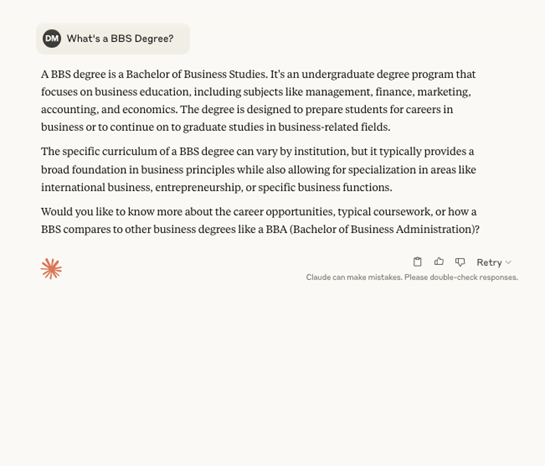
Reasoning Summary
Claude treated this as a straightforward informational request and responded without invoking its web search tool—even though search was enabled. Instead, it relied on its internal training data to deliver a well-structured explanation of the BBS degree, covering:
- A clear definition of the BBS (Bachelor of Business Studies)
- A general overview of core subjects (e.g., finance, marketing, management)
- Notes on specialization options (e.g., international business, entrepreneurship)
- A forward-looking note on career pathways and graduate study options
Notably, Claude did not cite any external sources, likely because the topic is stable, factual, and evergreen. For SEOs, this means that unless the query contains signals of recency, complexity, or ambiguity, Claude may choose not to surface or cite new content—even if your page is up-to-date and authoritative.
Implications and Action Items for Educational Marketers
- Don’t expect basic definitions to earn citations: When someone asks Claude a simple, factual question (like “What is a BBS degree?”), it often answers from its internal knowledge without triggering web search—meaning your content won’t be surfaced, even if it ranks well on Brave. To increase visibility, marketers should focus on more nuanced or current versions of the query—for example:
- “Top BBS degrees in 2025”
- “How a BBS compares to an MBA for job placement”
- “BBS degree requirements by region”
- Signal freshness and perspective: Use phrasing like “in 2025,” “updated curriculum,” or “latest changes in business studies” in your H1s, intros, and schema to increase the chance Claude sees your content as relevant for dynamic search responses.
- Add comparative depth: Claude hinted at deeper exploration by offering to compare BBS vs. BBA. If your content includes comparison tables, career trajectories, or institution-level insights, it’s more likely to be picked up.
- Structure for semantic scanning: Use headings like “What is a BBS degree?”, “BBS vs BBA”, “Career Opportunities”, “Subjects Covered”, etc. Claude looks for skimmable, labeled sections to extract answers.
- Target career- or region-specific search paths: Add pages that cover “BBS degree in [region]” or “Careers after BBS in 2025” to trigger Claude’s use of external sources.
AI Engine Comparative Snapshot
Education Query: “What is a BBS degree?”
| AI Engine | Description |
|---|---|
| ChatGPT Search | Offered comprehensive narratives with career context |
| Perplexity | Excelled at practical outcomes integration |
| Google AIO | Provided concise visual definitions |
| DeepSeek | Provides clear, curriculum-focused explanation with emphasis on career pathways |
| Claude with Search | Structured explanation drawn from internal knowledge; no search triggered; invites follow-up comparison (e.g., BBS vs. BBA) |
Claude – Industry Strengths and Weaknesses
| Strengths | Weaknesses |
|---|---|
| Clear academic definition and structured response | No citations or source transparency |
| Logical flow from concept to specialization options | No data on specific universities or programs |
| Strengths | Weaknesses |
|---|---|
| Professional, approachable tone | No cost, admission, or job market details |
| Summary-level explanation with degree-to-career framing | Doesn’t localize or customize for regions |
| Good at surfacing foundational degree insights | No examples of course length or student experience |
| Invites further exploration (e.g., BBS vs. BBA) | Reluctant to trigger web search unless forced by prompt complexity |
Claude – Formats
| Format Element | Description |
|---|---|
| Information Structure | Intro followed by paragraph-style elaboration |
| Content Organization | General → Specific → Optional Comparison Invitation |
| Presentation Style | Academic tone, full paragraphs without citations or lists |
| Educational Context | Emphasizes degree purpose, career applicability, and graduate potential |
| Learning Path | High-level summary of what the degree prepares you for |
Claude – Optimal Use Cases
| Use Case Category | Applicability |
|---|---|
| Initial Degree Understanding | ✅ Strong – explains concept, structure, and purpose clearly |
| Curriculum Overview | ✅ Covered at a general level |
| Career Path Exploration | ⚠️ Mentioned, but not detailed |
| Comparing with Other Degrees | ✅ Hinted at and encouraged (BBS vs. BBA) |
| Localized Program Discovery | ❌ Not triggered without region- or institution-specific query |
| Updated Program Content | ❌ Did not search, so no 2025-specific changes or trends included |
Marketing Implications
Claude’s handling of this education query suggests it is best positioned as a top-of-funnel informational surface, particularly for evergreen academic concepts. Because the query was straightforward and definitional, Claude responded using internal knowledge and did not trigger a web search, even with the feature enabled. That makes it less useful for surfacing updated program content or institutional differentiation—unless the query itself contains signals of complexity, recency, or specificity.
For educational marketers, the takeaway is clear: basic degree definitions alone are unlikely to earn visibility in Claude’s responses. Instead, focus on content that expands the topic—such as comparisons (e.g., BBS vs. BBA), 2025 curriculum updates, career outcome breakdowns, or regional program variations. These angles are more likely to trigger search and present an opportunity for citation.
To increase your chances of being cited, structure content with semantic clarity (e.g., “Career Opportunities with a BBS” or “Top BBS Programs in India”), use year-specific phrasing to signal freshness, and offer clear value beyond what Claude can generate from its model alone. Claude is excellent at summarizing stable academic concepts—but if your content adds perspective, depth, or specificity, it’s more likely to show up in its answers.
Restaurants – Local Search Query Intent Analysis
Query: “What restaurants have Tuesday specials near me?”
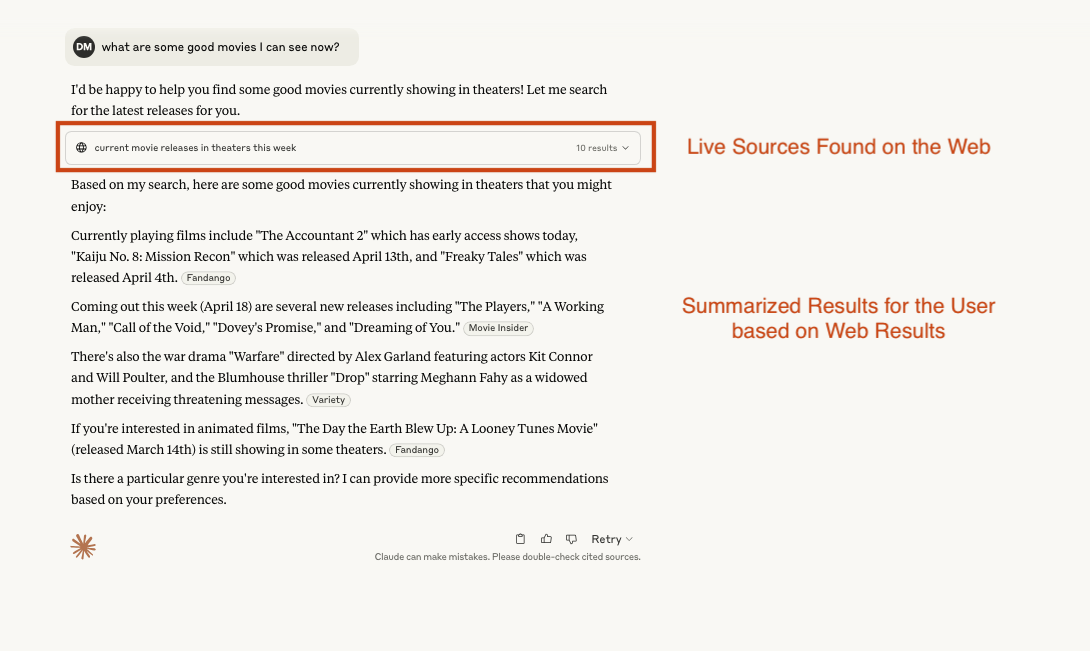
Reasoning Summary
Claude interpreted this query as a local, time-sensitive discovery query with two core signals:
- A location-specific intent (“Elmhurst, IL”)
- A calendar-specific filter (“Tuesday specials”)
It used web search (powered by Brave) to gather results from local sites, restaurant listings, and customer reviews. Claude did cite sources like Pints Elmhurst, Modern Plate, and 151 Kitchen | Bar, but acknowledged gaps in structured availability of Tuesday specials. Instead of surfacing confirmed offers, it inferred potentially relevant venues based on event type (“Trivia Tuesdays”) or partial information (“half-price bottle day”).
Notably, Claude:
- Prioritized named venues with localized relevance
- Offered partial matches when exact special info was unavailable
- Highlighted the ambiguity and invited the user to refine or broaden the search
- Did not hallucinate offers—it transparently noted what wasn’t available
This signals Claude’s conservative citation logic, likely to avoid misinformation if structured data isn’t present in Brave's index.
Implications and Action Items for Local SEO / Restaurant Marketers
- Publish Structured, Dated Specials: Clearly list “Tuesday Specials” or “Weekly Specials” with dates and times on the restaurant website. Claude can only cite what Brave can crawl and index.
- Use Schema for Menus and Events: Implement Menu, Event, or Offer schema with
dayOfWeekproperties to enable clear weekday-specific markup. - Local Listing Accuracy Matters: Ensure your business has consistent Name, Address, and Phone number (NAP) information across your website, Google Business Profile, Yelp, and Facebook. Claude cited venue details and user-generated content (UGC)—specifically customer reviews—when structured data wasn’t available.
- Build Landing Pages for Weekly Events: Claude cited “Trivia Tuesdays” as a relevant activity—so events, not just discounts, can rank. Dedicated “What’s Happening Tuesdays” content can increase citation opportunities.
- Avoid Relying on Third-Party Pages Alone: Claude may not fully trust aggregators like Yelp or TripAdvisor unless they present structured, crawlable content. Make sure your own site hosts the specials.
- Encourage Customer Reviews to Mention Specials: Claude picked up on phrases like “half-price bottle day” from review sites. Consider prompts that encourage happy diners to mention weekday promos.
AI Engine Comparative Snapshot
Local Search Query: “What restaurants have Tuesday specials near me (Elmhurst, IL)”
| AI Engine | Description |
|---|---|
| ChatGPT Search | Relied on Bing local listings; sometimes returned outdated Yelp or Google reviews |
| Perplexity | Listed restaurants with menus and operating hours; weak on weekday-specific specials |
| Google AIO | Pulled from Google Maps listings and restaurant sites with carousel or link previews |
| DeepSeek | Focused on top restaurants, but filtered based on structured menu mentions and local intent |
| Claude with Search | Used Brave-indexed local results; transparently flagged missing special-day data; cited trivia/event matches when available |
Claude – Industry Strengths and Weaknesses
| Strengths | Weaknesses |
|---|---|
| Transparent when exact data isn’t available | No real-time menus or booking integrations |
| Pulls from local sites, reviews, and event calendars | Does not surface structured menus unless directly embedded |
| Recognizes related event value (e.g., Trivia Tuesdays) | Partial reliance on indirect info like user-generated content |
| Promotes venue discovery even without exact match | Doesn't include photos, open table links, or reservation options |
| Encourages clarification/refinement in conversational flow | May miss restaurant pages without schema or clear weekday structure |
Claude – Formats
| Format Element | Description |
|---|---|
| Information Structure | Venue-by-venue listing, based on relevance and activity (not just specials) |
| Content Organization | Short summaries with brand names, offerings, and availability signals |
| Presentation Style | Bulleted and paragraph format with inline citations |
| Contextual Awareness | Recognizes day-of-week filters, location-specific terms, and event-based intent |
| Fallback Behavior | Offers related events or venues when direct match is unavailable |
Claude – Optimal Use Cases
| Use Case Category | Applicability |
|---|---|
| Weekly Local Promotions | ⚠️ Moderate – only when clearly stated or indexed |
| Neighborhood Discovery | ✅ Strong – good for surfacing lesser-known but relevant local options |
| Event-Night Planning | ✅ Strong – trivia, raffles, and other day-based themes are surfaced |
| Menu/Offer Lookup | ❌ Weak – does not reliably extract from PDFs or images |
| Reservation Support | ❌ Not integrated with real-time systems like OpenTable |
| Contextual “Near Me” Search | ✅ Strong – understood query’s location intent and searched locally |
Marketing Implications
Claude’s handling of the restaurant query highlights its utility as a local discovery tool—but with clear limits. It accurately understood both the location (“Elmhurst, IL”) and the calendar-based filter (“Tuesday specials”), and it used Brave Search to surface local venues and contextual matches. However, when exact weekday specials weren’t published in structured form, Claude didn’t guess. Instead, it transparently surfaced partial matches, like trivia nights or “half-price bottle” references pulled from customer reviews.
For local marketers, this underscores the importance of structured, crawlable content. If your Tuesday (or other weekday) specials aren’t clearly published on your website—or embedded using schema—Claude is unlikely to cite them. It may fall back on event mentions or user-generated reviews, but it won’t invent or speculate.
To improve visibility, restaurant brands should publish weekly specials and events in plain HTML, use schema for menus and offers, and maintain consistent local listing data. Additionally, content like “What’s Happening on Tuesdays” landing pages can expand your discoverability beyond deals alone. Claude is not a transactional assistant—it’s a discovery engine that rewards clarity, consistency, and contextual signals.
SEO Strategies for Claude Visibility
To earn visibility in Claude’s responses, SEO professionals need to ensure their content is both discoverable and citation-ready. Claude pulls from Brave Search, scanning the top 5–10 results and selecting content that directly answers the query—favoring sources that are structured, skimmable, and up to date. The first step is confirming that your content is indexable by Brave. Check your robots.txt for BraveBot access and verify that key pages are publicly accessible (no login gates, dynamic session URLs, or personalization that varies by user).
While Brave doesn’t offer a manual URL submission process like Google Search Console, inclusion in its index is influenced by activity from users of the Brave browser. Specifically, Brave’s Web Discovery Project requires that a page be visited by at least 20 unique Brave users who have opted into data sharing before it becomes eligible for indexing. For enterprise sites with strong organic performance, this threshold is typically met passively. That said, it’s important to ensure that high-priority URLs are structured for crawlability, drive consistent organic visibility, and are technically stable when visited—so they’re ready for indexing when those conditions are met.
Our observed examples reinforce this approach. In the e-commerce query about RC cars, Claude excluded outdated 2022 models and surfaced recent, 2025-specific products—demonstrating a preference for current content when a query implies time sensitivity. In contrast, the education query about BBS degrees didn’t trigger search at all—Claude relied on its internal model, likely due to the evergreen nature of the topic. For the local restaurant query, Claude searched Brave and listed venues with contextual clues about Tuesday specials, but declined to invent or misstate details it couldn’t verify—showing clear discipline in source selection.
To increase your likelihood of being cited:
- Your content must appear in the top results on Brave Search
- It must align closely with the user’s phrasing and intent
- It must offer concise, current answers—particularly for queries involving time-sensitive or product-specific details
Claude doesn’t cite every result, nor does it always search—but when it does, it evaluates sources based on usefulness, clarity, and direct relevance to the question. The best strategy is to treat your most important content as AI-visible assets: indexable, query-aligned, and ready to be cited when it counts.
Tips for Claude Friendly Page Formats
While the following formats are effective across most AI-powered search engines, they are particularly useful when optimizing for Claude’s behavior in Brave-powered search. In the examples we tested, Claude tended to cite content that was clear, extractable, and matched the structure of its own answers—often drawing directly from pages that used formats like these:
- ✅ FAQs – Claude frequently provides direct, conversational answers to question-style prompts. If your page includes common user questions in a Q&A format, especially near the top or in an FAQ section, it increases the chance Claude can lift and cite your content cleanly.
- ✅ Lists – “Top 10” posts, comparison lists, and steps-to guides match many of the ways Claude addresses queries.
- ✅ Glossaries & Definitions – If the query asks “What is…?”, make your definition concise and prominent.
- ✅ Schema – While we can’t confirm that Claude reads structured data directly (e.g., JSON-LD), Brave Search may use schema for context and result enrichment. Because Claude pulls from Brave’s top results, implementing schema could still help indirectly by influencing what Claude sees.
Conclusion
As more users turn to conversational AI tools for information, marketers need to think beyond traditional search engines. Claude with Search is part of this shift—but it brings a unique angle. Instead of relying on Google or Bing, Claude pulls from Brave Search, an independent index with its own signals and ranking logic. That makes it a distinct surface to optimize for—one that data suggests is just getting started in its growth trajectory.
What sets Claude apart isn’t just its language model, but how it filters and cites web content. When a query triggers search, Claude selects sources that are relevant, clearly written, and easy to extract from. It favors current information when the question calls for it and avoids citing vague or mismatched pages. That means your content doesn’t just need to rank—it needs to deliver value in a format Claude can use.
As Anthropic expands access to search and continues to refine how Claude retrieves and presents information, the ability to be cited in these responses will become more competitive—and more valuable. SEO professionals who adapt early, monitor how their content appears in Claude, and build with these behaviors in mind will be better positioned to gain visibility across this new class of AI-powered search.